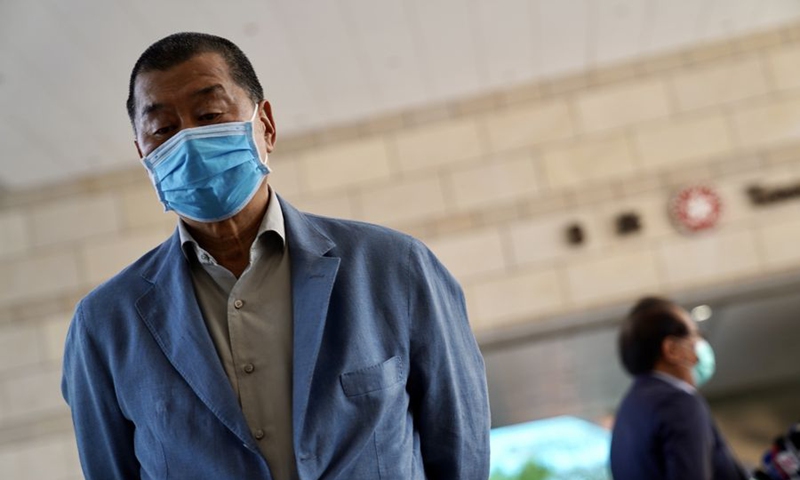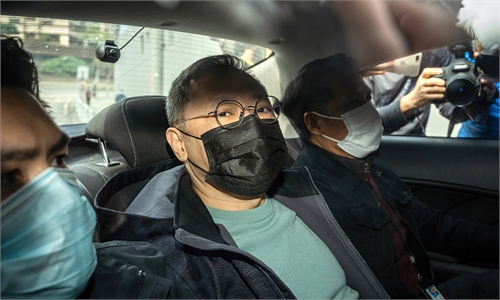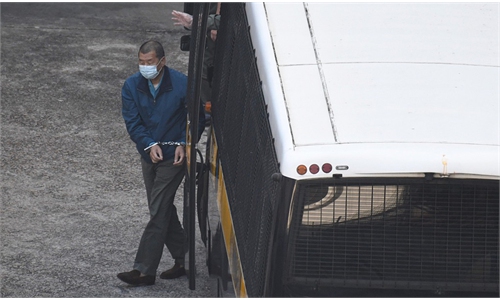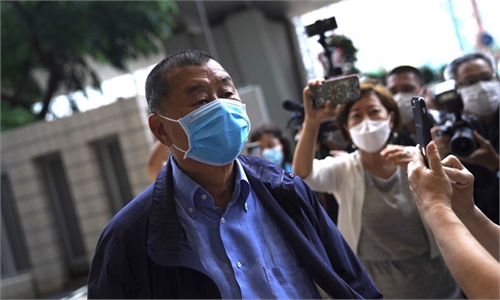
Photo taken on May 5, 2020 shows Jimmy Lai Chee-ying appearing in court on unauthorized assembly charge in Hong Kong, China. (Xinhua/Lui Siu Wai)
Hong Kong's pro-secessionist media tycoon Jimmy Lai pleaded guilty to taking part in an unauthorized assembly in August 2019 for the first time after the national security law for Hong Kong took effect in June 2020.
Lai faces multiple charges related to the yearlong social turmoil in the Hong Kong Special Administrative Region (HKSAR) in 2019, and has gone through multiple trials, but has never pleaded guilty in court before a trial until Wednesday. Nonetheless, the guilty plea should not be seen as a form of remorse, legal experts said.
Hong Kong media reported on Wednesday that Lai, along with former lawmaker Lee Cheuk-yan and former Democratic Party chairman Yeung Sum, pleaded guilty to taking part in an authorized assembly on August 31, 2019 which was banned by police beforehand.
Some observers said that Lai and his legal team believe that the prosecution had comprehensive evidence and that the trial would definitely result in a conviction. So it was in Lai's best interest to plead guilty early.
Kennedy Wong Ying-ho, solicitor of the Supreme Court of Hong Kong, told the Global Times that the main reason for Lai's guilty plea is that this case is very similar to the illegal assembly case tried last week and was heard by the same judge.
However, Wong does not believe that this move demonstrates Lai's remorseful attitude. "Taking part in an unauthorized assembly is a relatively minor charge and the evidence was strong, which is why Lai chose to plead guilty."
Tian Feilong, an associate professor at Beihang University, told the Global Times on Wednesday that one of the purposes of Lai's "strategic confession" is to win the sympathy of the public and the judge, so as to gain a favorable public opinion for a lighter sentence in his case for allegedly violating the national security law.
The three defendants all face a maximum sentence of five years in jail on this charge under the Public Order Ordinance. Legal experts say that although Lai pleaded guilty before the trial, he should not receive a reduced sentence.
Tian said that in cases involving the national security law, the court should fully weigh the long-term harm Lai has done to Hong Kong's constitutional order and China's national interest, and give him appropriate penalties to ensure that he will not harm the country's sovereignty and security in the future.
As the general agent of the local extremist forces and the external forces in Hong Kong, it is difficult for Lai to be replaced by others in the short term… Moreover, Lai may still continue to engage in the so-called "political protest movement" in different ways, Tian said.
"Traditionally, if a defendant pleads guilty before a trial, the sentencing threshold was generally reduced by a third," Wu Yingpeng, a lawyer and barrister-at-law in Hong Kong, told the Global Times, "However, the court should not give excessive sentence reductions to defendants who waste judicial resources and drag out their guilty pleas until the end."
Last Thursday, Lai and six former lawmakers were convicted for organizing and taking part in another unauthorized assembly on August 18, 2019. Lai still has two cases involving unauthorized assemblies, which are expected to be arraigned in May and June, media reported.
The 73-year-old was repeatedly denied bail over the past few months as a risk of continuing to commit acts that may endanger national security. He also awaits trial over a national security case. Observers noted that the convictions and the guilty pleas will serve as reference for other charges against Lai in the future, so that the judge can understand his character and make a fair decision and sentence that can deter anti-government rioters.
Experts said that it is highly unlikely for Lai to plead guilty when facing serious charges involving the national security law for HKSAR in future trials.



